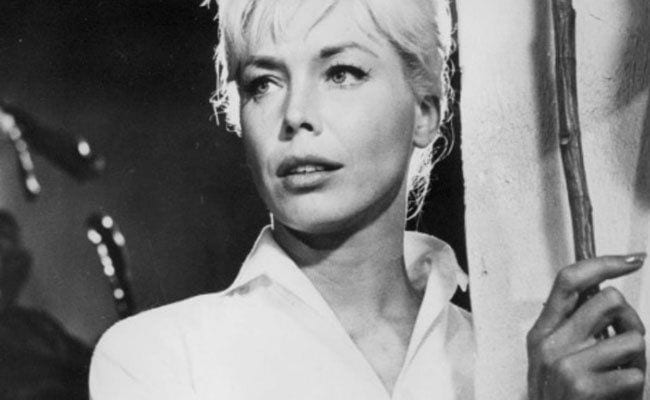Shabby and unkempt, Duke (Corey Allen) and Boots (Warren Oates) drift to a gas station and intimidate the owner into giving them free orange pop. Then, they squat on their haunches and talk about sex. Boots says he’s “never made it” because he’s saving himself for marriage, and he bristles when Duke says he’s looking for a “sugar daddy”. To pacify him, Duke says he’ll fix it up for Boots with some “twitch”. When they spot a fine blonde woman, a nervous salesman (Jerome Cowan) tells them she’s out of their class, but they persuade him to give them a lift and follow her car, at one point threatening him with knives to continue.
So these boys are established from the start as all bullies and tough talk, giving an air of menace that carries them through a slow-burning psychological study in which we wait to see if anything violent will happen, or anything sexual, or both. From the empty house next door, they spy on the pretty woman, Ann (Kate Manx), who spends most of the day by her swimming pool. Her heated pool is as much a symbol for herself as the switchblades are for the uptight, sexually bantering drifters, and it’s hard to miss the symbolism.
In 1960, Leslie Stevens wrote and directed this very cheap independent production, shot in his house and starring his wife. He would move on to a productive career in TV, most notably with The Outer Limits. This debut feature, as did his pioneering Esperanto movie Incubus (1966) with William Shatner, vanished without a trace.
Just as that film was finally rediscovered after decades, it’s now time for this forgotten exercise in moody drama to come in from the cold with a crisply restored print that shows off the beautiful black and white photography of veteran DP Ted McCord (The Treasure of the Sierra Madre[1948], East of Eden [1955], The Sound of Music [1965]) and his equally talented young assistant Conrad Hall, who would soon work on The Outer Limits and go on to win three Oscars. Also receiving a prominent credit, and interviewed in an extra is still photographer Alexander Singer, who would soon direct his own indie dramas on sexual themes, such as A Cold Wind in August (1961).
While the main performances are better than you’d expect in a shady melodrama, the photography is what makes the picture as it frames or entraps its characters in claustrophobic compositions, even when outdoors. They’re enclosed by cars, reflective windows, wicker cages, gin glasses, and, of course, the rippling pool and its eerie reflections. This is especially true in the last act, scored insistently by a bolero on the stereo.
In the early ’60s, Hollywood was struggling to convey the idea that people now and then have sex. It had successfully avoided that implication for so long that it hardly knew how to handle it, and movies that tried to push the notion achieved controversy and sometimes local censorship. A few major studio examples around this time include A Summer Place (1959), Strangers When We Meet (1960), Splendor in the Grass (1961), and several items with Deborah Kerr, the only actress classy and British enough to get away with being cast consistently as an adulteress.
Stevens’ film, to quote the nervous salesman, isn’t in their class, and consequently, it feels that much more seamy and sweaty and tawdry as Duke, supposedly on behalf of Boots, begins his sweet-talking seduction of Ann, who turns out to be frustrated in her relationship with her insurance-peddling husband (Robert Ward). While the notes mention the movie’s influence by certain noir films, it has less to do with those than with pointing the way forward to adult dramas of the type Hollywood couldn’t quite permit itself to make yet.
For now, the slack had to be taken up by such low-budget indie fare, and this is still a movie where nobody “makes it”. The impulse is usually displaced in studio-era movies, especially in those allegedly naughty comedies where everyone talks about sex and nobody has it, e.g., The Marriage-Go-Round (1961), also written and produced by Leslie Stevens. Stevens’ script for Private Property seems well aware of this concept of repressed impulses driving action, which accounts for the suggestive dialogue about sugar daddies and the strange three-way tango between the two mugs and their supposed quarry.
The film Private Property resembles the wonderful 1972 feature debut of writer-director Larry Cohen, another hothouse drama of two drifters, a bored wife, and her husband, complete with a portentous swimming pool. It goes by various names, including Bone, but I saw it as Housewife, a title that echoes the real estate theme of Private Property, with both wives seen as restless trophy objects tied to expensive houses. Since one of the drifters is played by Yaphet Kotto, Cohen’s film adds a racial theme. They’d make an excellent double feature.
This Cinelicious package is a Blu-ray/DVD combo with Singer’s brief interview, a new trailer, and a cogent booklet. UCLA Film and Television Archive performed the 4 K digital restoration. It’s advertised as a limited edition of 3,000 copies.


